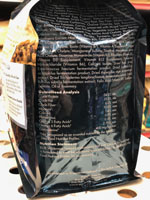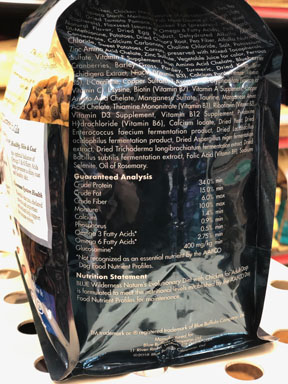
Vitamin D

VIN News Service photo
While Blue Buffalo is not involved in this latest recall, the brand’s Wilderness diets (pictured) were
pulled from store shelves in 2010, due to excessive amounts of vitamin D. The company blamed contamination by a supplier that made a vitamin D supplement for poultry prior to mixing Blue Buffalo ingredients.
A recent rash of vitamin D-linked pet-food recalls have some experts speculating that dozen or so canine kibble brands involved get their premixed vitamins from the same place — a supplier whose identity is not known publicly.
"We're all scratching our heads on this one," said Greg Aldrich, a research associate professor and coordinator of the Pet Food Program at Kansas State University. "It may have been a mis-formulation or an accident in production. It appears [these recalls] are all coming out of one manufacturing firm, but I don't know where they're buying their premixes or their ingredients.
"That's 100 percent speculation from the outside looking in."
In mid-October, the U.S. Food and Drug Administration initiated an investigation into the causal relationship between dry kibble and illness in dogs, having received two reports of hypervitaminosis D and an alert that Utah state authorities also were investigating a link between some dog-food brands and vitamin D toxicity. FDA scientists evaluated samples of various dog food brands, and the analysis is still underway, said Anne Norris, a health communications specialist at FDA.
An initial batch of recalls was issued Nov. 2. In an FDA alert published Dec. 3, the agency noted that many of the affected brands share a common contract manufacturer. Asked where the pet-food makers get their premixed vitamins, Norris replied, "We are unable to comment on how impacted companies source their ingredients ..." Of the samples tested by state and private laboratories, some contained as much as 70 times the intended vitamin D amount.
"Vitamin D is an essential nutrient for dogs, but very high amounts can cause serious health problems like kidney failure and death," the FDA warned on its website. To date, the agency has received 16 reports associated with recalled products. No fatalities have been reported.
Overdoses of vitamin D can lead to a range of signs in dogs, from drooling, constipation and/or vomiting, to seizing. Increased urination and thirst also are commonly reported. Vitamin D poisoning can increase levels of calcium in the blood, a condition known as hypercalcemia.
The cure for vitamin D toxicosis often is simple and swift, involving a change in a dog's diet. However, Dr. Sherri Wilson warns that false assumptions following a diagnosis of hypercalcemia — also a common indicator of cancer — could lead to a dog's death.
"My fear is that some people will euthanize their dogs, thinking they probably have cancer as the cause of the hypercalcemia, but the problem could be diet-related vitamin D overdose, which will resolve if the diet is changed and the dog receives supportive care while ill," said Wilson, an internal-medicine consultant with the Veterinary Information Network, an online community for the profession and parent of the VIN News Service.
Eleven brands of pet food were recalled between Nov. 2 and Dec. 5 for excessive levels of vitamin D. The largest manufacturer among them is Sunshine Mills Inc. of Red Bay, Alabama, which produces seven of the recalled brands. The recalled products are:
- Sunshine Mills Inc., Abound Chicken and Brown Rice Recipe Dog Food
- Sunshine Mills Inc./Ahold Delhaize, Nature's Promise Chicken and Brown Rice Dog Food
- Sunshine Mills Inc./Ahold Delhaize, Nature's Place Real Country Chicken and Brown Rice Dry Dog Food
- Sunshine Mills Inc., Evolve Puppy Formula (Chicken & Rice)
- Sunshine Mills Inc., Sportsman's Pride Large Breed Puppy Formula
- Sunshine Mills Inc., Triumph Chicken and Rice Recipe
- Sunshine Mills Inc./Lidl USA, Orlando Grain Free Chicken and Chickpea Superfood Recipe Dog Food
- ANF Pet Inc., ANF Pet Lamb and Rice Dog Food
- Elm Pet Foods Inc., Elm Chicken and Chickpea Recipe
- Nutrisca Chicken and Chickpea Dry Dog Food
- Natural Life Chicken and Potato Dry Dog Food
VIN News Service contacted all of the companies listed. To date, no one has responded.
Vitamin D is expensive, Aldrich said, noting that vitamins used in pet foods are made by the same manufacturers serving human food and supplement markets.
"No pet food company would add too much of it intentionally to cheapen their product," he said. "Usually, a formula calls for specific ingredients to be included, and most of these vitamins come in a premix. If for some reason, anything along the process is mishandled … we can get a shortage or excess."
He noted that while a perception exists that smaller pet food makers generate more recalls than larger companies such as Nestlé Purina and Hill's, that's not necessarily the case. Formulation mistakes or contamination can affect big and small companies, Adrich said. In March 2016, five varieties of Purina's Pro Plan wet dog food were recalled because of inadequate vitamin/mineral levels. A single lot of Purina Veterinary Diets OM Overweight Management Feline Formula was recalled in 2015 because of inadequate levels of thiamine. In 2014, Hill's Pet Nutrition recalled bags of dry dog food due to potential Salmonella contamination.
"The perception is that boutique pet food makers have more problems than the large companies," Aldrich said. "But the bigs have just as many issues."
Across all recalls, some could be indicative of an industry that's moving away from long-term feeding studies that involve testing on research animals prior to a food going to market, Aldrich said. "Even the big brands discontinued doing that about 15 years ago, when they got heat from animal-rights activists," he said. "Some still conduct feeding trials, but not many."
The result, he said, is that many dietary formulations aren't pretested on live animals before hitting store shelves. Rather, they meet formula guidelines set forth by the Association of American Feed Control Officials. According to the AAFCO model standards, which have been adopted by many states, pet foods marketed as "complete and balanced" must either meet one of AAFCO's dog or cat food nutrient profiles or pass a feeding trial using AAFCO procedures.
Most labels on pet foods sold in the U.S. contain a nutritional-adequacy statement that specifies whether a given formulation was tested in feeding trials or simply meets AAFCO nutrient profiles.
Despite the high cost of vitamin D analysis and tricky assay methodology, veterinary nutritionist Dr. Jennifer Larsen advocates for consistently testing batches of premixed vitamins before they're used in pet food. There's a narrow margin between a safe amount of vitamin D and a toxic level, she said.
"It would be expensive, and it's difficult due to challenges with accurate analysis," said Larsen, an assistant professor of clinical nutrition at the University of California, Davis, School of Veterinary Medicine. "But I think it is warranted, given the possible consequences of mistakes."
Update: Hill's Pet Nutrition announced Feb. 4 the recall of some canned dog foods due to concerns of elevated vitamin D levels. The recalled foods are listed on FDA's website.
Correction: A previous version of this article mistakenly listed Tuffy's as a manufacturer of recalled products. To date, Tuffy's has not been involved in the vitamin D recall.